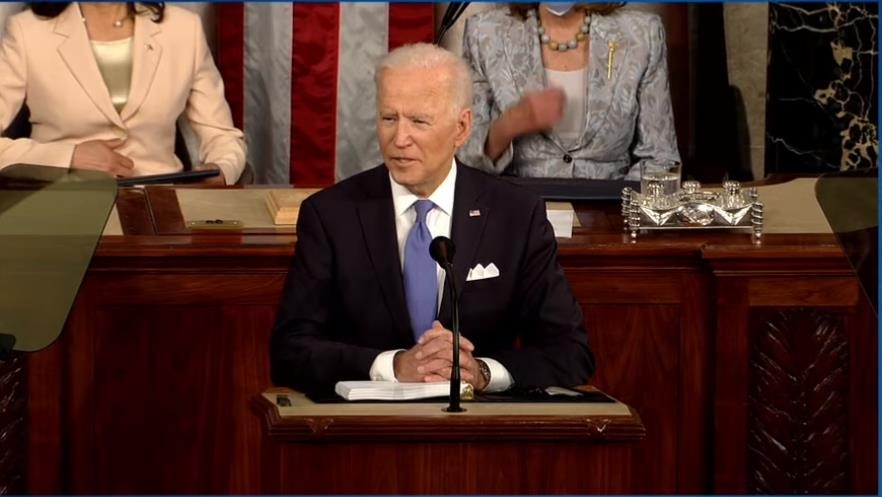 |
This image captured from the website of the White House shows US.President Joe Biden addressing the US Congress in Washington on Wednesday. (White House) |
WASHINGTON -- US President Joe Biden said Wednesday he will work with allies to address threats from North Korea and Iran through "diplomacy" and "stern deterrence."
Biden made the remark during his first address to a joint session of Congress, calling the nuclear programs of Pyongyang and Tehran "a serious threat to America's security and world security."
"We are going to be working closely with our allies to address the threats posed by both of these countries through diplomacy, as well as stern deterrence," Biden said in the address attended by only about one-fifth of US senators and representatives due to social distancing measures.
The United States has been conducting a comprehensive review of its North Korea policy that it says will provide a new approach to dealing with the recalcitrant North.
The Biden administration has also reached out to North Korea for engagement since mid-February, but Pyongyang remains unresponsive to the US overtures.
Biden stressed the importance of working with allies in dealing with various challenges facing his country.
"My fellow Americans, we have to show not just that we are back, we are here to stay. And that we aren't going to go it alone, going to be leading with our allies," the president said.
"No one nation can deal with all the crises of our time alone -- from terrorism to nuclear proliferation, mass migration, cybersecurity, climate change, as well as what we are experiencing now, pandemics."
Biden is set to hold an in-person meeting with South Korean President Moon Jae-in in Washington next month.
A senior US administration official earlier said the Biden-Moon summit will mark another diplomatic and national security "milestone" in Biden's first 100 days in office.
Biden also promised support for countries struggling with the COVID-19 pandemic.
"There's no wall high enough to keep any virus out. And our own vaccine supply, as it grows to meet our needs, and we're meeting them, we'll become an arsenal for vaccines for other countries. Just as American is an arsenal for democracy for the world," he said.
He earlier said the United States may consider providing up to 60 million doses of the AstraZeneca vaccine to countries in need, pending the outcome of a safety review by the US Food and Drug Administration.
Earlier Wednesday, the US said it will send 20 million doses of the AstraZeneca Vaccine to India, which is facing one of the worst spikes in COVID-19 infections, with over 2,000 people dying from the novel coronavirus daily.
Biden and his administration have repeatedly named China as the largest and most serious challenge they face.
Biden said he has told his Chinese counterpart, Xi Jinping, that the US will continue to maintain a strong military presence in the Indo-Pacific region.
"I also told President Xi that we will maintain a strong military presence in the Indo—Pacific just as we do with NATO in Europe, not to start a conflict but to prevent one," he said.
Biden also said he told Xi that the US "won't back away from our commitment to human rights and fundamental freedoms."
"No responsible American president can remain silent when basic human rights are violated," he said.
While Biden's first presidential address to Congress focused mostly on domestic issues, such as ways to overcome the ongoing pandemic and its economic fallout, he also underlined his administration's efforts to ensure equity and social justice for all people.
"And with the plans outlined tonight, we have a real chance to root out systemic racism that plagues American lives in other ways," the US leader said.
He also welcomed the recent passage of an anti-Asian hate crimes bill by the Senate.
"I also want to thank the United States Senate for voting 94 to one to pass COVID-19 Hate Crimes Act to protect Asian American Pacific Islander," Biden said, noting America has seen the "viciousness of hate crimes" for too long.
"I urge the House to do the same and send that legislation to my desk, which I will gladly, anxiously sign."
The bill, if enacted, would allow expedited federal government investigation into hate incidents targeting Asian Americans and Pacific Islanders.
The House of Representatives is expected to vote on the Hate Crimes Act in early May. (Yonhap)








